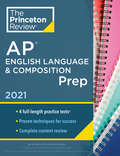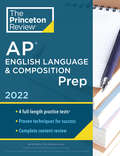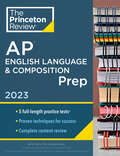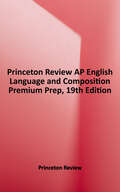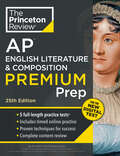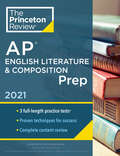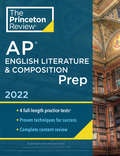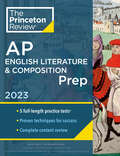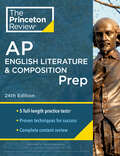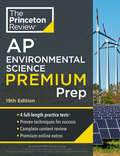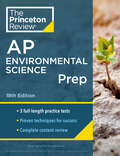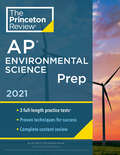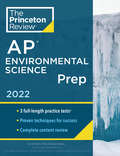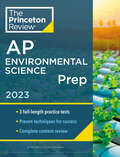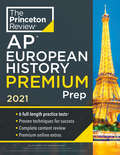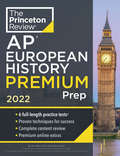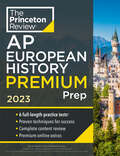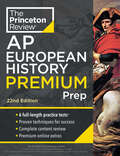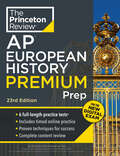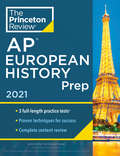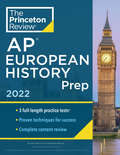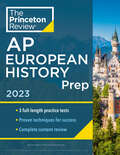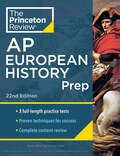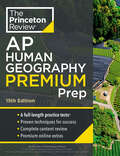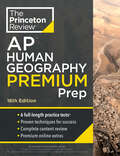- Table View
- List View
Princeton Review AP English Language & Composition Prep, 2021: 4 Practice Tests + Complete Content Review + Strategies & Techniques (College Test Preparation)
by The Princeton ReviewEVERYTHING YOU NEED TO SCORE A PERFECT 5—now with 2x the practice of previous editions!Ace the 2021 AP English Language & Composition Exam with this comprehensive study guide—including 4 full-length practice tests with complete explanations, thorough content reviews, targeted strategies for every section of the exam, and access to online extras.Techniques That Actually Work.• Tried-and-true strategies to help you avoid traps and beat the test• Tips for pacing yourself and guessing logically• Essential tactics to help you work smarter, not harderEverything You Need to Know to Help Achieve a High Score.• Comprehensive review of the synthesis, rhetorical analysis,and argumentative essays• Engaging coverage of word use and rhetorical modes to help you improve your writing progress• Updated to align with the latest College Board standards• Access to study plans, a handy list of key terms, helpful pre-college information, and more via your online Student ToolsPremium Practice for AP Excellence.• 4 full-length practice tests (3 in the book, 1 online) with detailed answer explanations• Pacing drills to help you maximize points on the Reading and new Writing passages• Detailed guides for the new analytical scoring rubrics
Princeton Review AP English Language & Composition Prep, 2022: 4 Practice Tests + Complete Content Review + Strategies & Techniques (College Test Preparation)
by The Princeton ReviewEVERYTHING YOU NEED TO SCORE A PERFECT 5! Ace the 2022 AP English Language & Composition Exam with this comprehensive study guide—including 4 full-length practice tests with complete explanations, thorough content reviews, targeted strategies for every section of the exam, and access to online extras.Techniques That Actually Work.• Tried-and-true strategies to help you avoid traps and beat the test• Tips for pacing yourself and guessing logically• Essential tactics to help you work smarter, not harderEverything You Need for a High Score.• Up-to-date information on the 2022 AP English Language & Composition Exam• Comprehensive review of the synthesis, rhetorical analysis, and argumentative essays• Engaging coverage of word use and rhetorical modes• Access to study plans, a list of key terms, helpful pre-college information, and more via your online Student Tools accountPremium Practice for AP Excellence.• 4 full-length practice tests (3 in the book, 1 online) with detailed answer explanations• Pacing drills to help you maximize points on the Reading and Writing passages• Detailed guides for the new analytical scoring rubrics
Princeton Review AP English Language & Composition Prep, 2023: 5 Practice Tests + Complete Content Review + Strategies & Techniques (College Test Preparation)
by The Princeton ReviewEVERYTHING YOU NEED TO SCORE A PERFECT 5! Ace the 2023 AP English Language & Composition Exam with this comprehensive study guide—including 5 full-length practice tests with complete explanations, thorough content reviews, targeted strategies for every section of the exam, and access to online extras. Techniques That Actually Work • Tried-and-true strategies to help you avoid traps and beat the test • Tips for pacing yourself and guessing logically • Essential tactics to help you work smarter, not harder Everything You Need for a High Score • Up-to-date information on the 2023 AP English Language & Composition Exam • Comprehensive review of the synthesis, rhetorical analysis, and argumentative essays • Engaging coverage of word use and rhetorical modes • Access to study plans, a list of key terms, helpful pre-college information, and more via your online Student ToolsPractice You Way to Excellence • 5 full-length practice tests (4 in the book, 1 online) with detailed answer explanations • Pacing drills to help you maximize points on the Reading and Writing passages • Detailed guides for the new analytical scoring rubrics
Princeton Review AP English Language and Composition Prep, 19th Edition
by The Staff of The Princeton ReviewPremium Practice For A Perfect 5! Ace the new Digital AP English Language & Composition Exam with The Princeton Review's comprehensive study guide—including 8 practice tests with answer explanations, timed online practice, and thorough content reviews. Techniques That Work - Tried-and-true strategies to help you avoid traps and beat the test - Tips for pacing yourself and guessing logically - Essential tactics to help you work smarter, not harder Everything You Need for a High Score - Updated to address the new digital exam - Comprehensive review of the synthesis, rhetorical analysis, and argumentative essays - Online digital flashcards to review core content - Access to study guides, a handy list of key terms and concepts, helpful pre-college information, and more via your online Student Tools Premium Practice for AP Excellence - 8 full-length practice tests (5 in the book, 3 online) with detailed answer explanations - Online tests provided as both digital versions (with timer option to simulate exam experience) online, and as downloadable PDFs (with interactive elements mimicking the exam interface) - Pacing drills to help you maximize points on the Reading and Writing passages
Princeton Review AP English Literature & Composition Premium Prep, 25th Edition: 5 Practice Tests + Digital Practice Online + Content Review (College Test Preparation)
by The Princeton ReviewPREMIUM PRACTICE FOR A PERFECT 5! Ace the new Digital AP English Literature & Composition Exam with The Princeton Review's comprehensive study guide—including 5 practice tests with answer explanations, timed online practice, and thorough content reviews.Techniques That Actually Work• Tried-and-true strategies to help you avoid traps and beat the test• Tips for pacing yourself and guessing logically• Essential tactics to help you work smarter, not harderEverything You Need for a High Score• Updated to address the new digital exam• Comprehensive review of the synthesis, rhetorical analysis, and argumentative essays• Coverage of terminology and rhetorical modes for improved writing• Online digital flashcards to review core content, plus study plans and more via your online Student ToolsPremium Practice for AP Excellence• 5 full-length practice tests (4 in the book, 1 online) with detailedanswer explanations• Online test provided as both a digital version (with timer option to simulate exam experience) online, and as a downloadable PDF (with interactive elements mimicking the exam interface)• Pacing drills and detailed analytical scoring rubric guides
Princeton Review AP English Literature & Composition Prep, 2021: Practice Tests + Complete Content Review + Strategies & Techniques (College Test Preparation)
by The Princeton ReviewEVERYTHING YOU NEED TO HELP SCORE A PERFECT 5—now with 33% more practice than previous editions! Ace the 2021 AP English Literature & Composition Exam with The Princeton Review's comprehensive study guide. Includes 3 full-length practice tests, thorough content reviews, targeted strategies for every section, and access to online extras.Techniques That Actually Work.• Tried-and-true strategies to help you avoid traps and beat the test• Tips for pacing yourself and guessing logically• Essential tactics to help you work smarter, not harderEverything You Need to Know to Help Achieve a High Score.• Comprehensive coverage of all test topics• Up-to-date information on the 2021 course & exam• Engaging activities to help you critically assess your progress• Access to study plans, helpful pre-college information, and more via your online Student ToolsPractice Your Way to Excellence.• 3 full-length practice tests with detailed answer explanations• Practice drills for poetry and prose passages• Sample essays with tips to help you effectively plan and organize your own writing on the day of the exam
Princeton Review AP English Literature & Composition Prep, 2022: 4 Practice Tests + Complete Content Review + Strategies & Techniques (College Test Preparation)
by The Princeton ReviewEVERYTHING YOU NEED TO HELP SCORE A PERFECT 5! Ace the 2022 AP English Literature & Composition Exam with The Princeton Review's comprehensive study guide. Includes 4 full-length practice tests, thorough content reviews, targeted strategies for every section, and access to online extras.Techniques That Actually Work.• Tried-and-true strategies to help you avoid traps and beat the test• Tips for pacing yourself and guessing logically• Essential tactics to help you work smarter, not harderEverything You Need for a High Score.• Fully aligned with the latest College Board standards for AP® English Literature & Composition• Comprehensive coverage of all test topics• Engaging activities to help you critically assess your progress• Access to study plans, helpful pre-college information, and more via your online Student Tools accountPractice Your Way to Excellence.• 4 full-length practice tests (3 in the book, 1 online) with detailed answer explanations• Practice drills for poetry and prose passages• Sample essays with tips to help you effectively plan and organize your writing on the day of the exam
Princeton Review AP English Literature & Composition Prep, 2023: 5 Practice Tests + Complete Content Review + Strategies & Techniques (College Test Preparation)
by The Princeton ReviewEVERYTHING YOU NEED TO HELP SCORE A PERFECT 5! Ace the 2023 AP English Literature & Composition Exam with The Princeton Review's comprehensive study guide. Includes 5 full-length practice tests, thorough content reviews, targeted strategies for every section, and access to online extras. Techniques That Actually Work • Tried-and-true strategies to help you avoid traps and beat the test • Tips for pacing yourself and guessing logically • Essential tactics to help you work smarter, not harder Everything You Need for a High Score • Fully aligned with the latest College Board standards for AP® English Literature & Composition • Comprehensive coverage of all test topics • Engaging activities to help you critically assess your progress • Access to study plans, helpful pre-college information, and more via your online Student Tools Practice Your Way to Excellence • 5 full-length practice tests (4 in the book, 1 online) with detailed answer explanations • Practice drills for poetry and prose passages • Sample essays with tips to help you effectively plan and organize your writing on the day of the exam
Princeton Review AP English Literature & Composition Prep, 24th Edition: 5 Practice Tests + Complete Content Review + Strategies & Techniques (College Test Preparation)
by The Princeton ReviewEVERYTHING YOU NEED TO HELP SCORE A PERFECT 5! Ace the AP English Literature & Composition Exam with The Princeton Review's comprehensive study guide. Includes 5 full-length practice tests, thorough content reviews, targeted strategies for every section, and access to online extras.Techniques That Actually Work• Tried-and-true strategies to help you avoid traps and beat the test• Tips for pacing yourself and guessing logically• Essential tactics to help you work smarter, not harderEverything You Need for a High Score• Fully aligned with the latest College Board standards for AP® English Literature & Composition• Comprehensive coverage of all test topics• Engaging activities to help you critically assess your progress• Access to study plans, helpful pre-college information, and more via your online Student ToolsPractice Your Way to Excellence• 5 full-length practice tests (4 in the book, 1 online) with detailed answer explanations• Practice drills for poetry and prose passages• Sample essays with tips to help you effectively plan and organize your writing on the day of the exam
Princeton Review AP Environmental Science Premium Prep, 19th Edition: 4 Practice Tests + Complete Content Review + Strategies & Techniques (College Test Preparation)
by The Princeton ReviewPREMIUM PRACTICE FOR A PERFECT 5! Ace the AP Environmental Science Exam with The Princeton Review's comprehensive study guide—including 4 full-length practice tests (3 in book; 1 online) with complete explanations, thorough content reviews, targeted strategies for every question type, and access to online extras.Techniques That Actually Work• Tried-and-true strategies to help you avoid traps and beat the test• Tips for pacing yourself and guessing logically• Essential tactics to help you work smarter, not harderEverything You Need for a High Score• Targeted review of commonly tested concepts for the AP® Environmental Science Exam• Detailed figures, graphs, and charts to illustrate important world environmental phenomena• Thorough lists of key terms for every content review chapter• Online digital flashcards to review core contentPremium Practice for AP Excellence• 4 full-length practice tests (3 in the book and 1 online) with detailed answer explanations and scoring worksheets• Practice drills at the end of each content review chapter• Quick-study glossary of the terms you should know
Princeton Review AP Environmental Science Prep, 18th Edition: 3 Practice Tests + Complete Content Review + Strategies & Techniques (College Test Preparation)
by The Princeton ReviewEVERYTHING YOU NEED TO HELP SCORE A PERFECT 5! Ace the AP Environmental Science Exam with this comprehensive study guide—including 3 full-length practice tests with complete explanations, thorough content reviews, targeted strategies for every question type, and access to online extras.Techniques That Actually Work• Tried-and-true strategies to help you avoid traps and beat the test• Tips for pacing yourself and guessing logically• Essential tactics to help you work smarter, not harderEverything You Need for a High Score• Fully aligned with the latest College Board standards for AP Environmental Science• Thorough content review on all nine units covered in the Course and Exam Description• Detailed figures, graphs, and charts to illustrate important world environmental phenomena• Access to study plans, helpful pre-college information, and more via your online Student ToolsPractice Your Way to Excellence• 3 full-length practice tests with detailed answer explanations and scoring worksheets• Practice drills at the end of each content review chapter• Quick-study glossary of the terms you should know
Princeton Review AP Environmental Science Prep, 2021: 3 Practice Tests + Complete Content Review + Strategies & Techniques (College Test Preparation)
by The Princeton ReviewEVERYTHING YOU NEED TO HELP SCORE A PERFECT 5, now with 33% more practice than previous editions!Ace the 2021 AP Environmental Science Exam with this comprehensive study guide—including 3 full-length practice tests with complete explanations, thorough content reviews, targeted strategies for every question type, and access to online extras. Techniques That Actually Work.• Tried-and-true strategies to help you avoid traps and beat the test• Tips for pacing yourself and guessing logically• Essential tactics to help you work smarter, not harderEverything You Need to Know to Help Achieve a High Score. • Detailed figures, graphs, and charts to illustrate important world environmental phenomena• Updated to align with the latest College Board standards• Thorough lists of key terms for every content chapter• Access to study plans, helpful pre-college information, and more via your online Student ToolsPractice Your Way to Excellence.• 3 full-length practice tests with detailed answer explanations and scoring worksheets• Practice drills at the end of each content review chapter• Quick-study glossary of the terms you should know
Princeton Review AP Environmental Science Prep, 2022: Practice Tests + Complete Content Review + Strategies & Techniques (College Test Preparation)
by The Princeton ReviewEVERYTHING YOU NEED TO HELP SCORE A PERFECT 5! Ace the 2022 AP Environmental Science Exam with this comprehensive study guide—including 3 full-length practice tests with complete explanations, thorough content reviews, targeted strategies for every question type, and access to online extras. Techniques That Actually Work.• Tried-and-true strategies to help you avoid traps and beat the test• Tips for pacing yourself and guessing logically• Essential tactics to help you work smarter, not harderEverything You Need to Know to Help Achieve a High Score. • Fully aligned with the latest College Board standards for AP Environmental Science• Thorough content review on all nine units covered in the Course and Exam Description• Detailed figures, graphs, and charts to illustrate important world environmental phenomena• Access to study plans, helpful pre-college information, and more via your online Student ToolsPractice Your Way to Excellence.• 3 full-length practice tests with detailed answer explanations and scoring worksheets• Practice drills at the end of each content review chapter• Quick-study glossary of the terms you should know
Princeton Review AP Environmental Science Prep, 2023: 3 Practice Tests + Complete Content Review + Strategies & Techniques (College Test Preparation)
by The Princeton ReviewEVERYTHING YOU NEED TO HELP SCORE A PERFECT 5! Ace the 2023 AP Environmental Science Exam with this comprehensive study guide—including 3 full-length practice tests with complete explanations, thorough content reviews, targeted strategies for every question type, and access to online extras. Techniques That Actually Work • Tried-and-true strategies to help you avoid traps and beat the test • Tips for pacing yourself and guessing logically • Essential tactics to help you work smarter, not harder Everything You Need for a High Score • Fully aligned with the latest College Board standards for AP Environmental Science • Thorough content review on all nine units covered in the Course and Exam Description • Detailed figures, graphs, and charts to illustrate important world environmental phenomena • Access to study plans, helpful pre-college information, and more via your online Student Tools Practice Your Way to Excellence • 3 full-length practice tests with detailed answer explanations and scoring worksheets • Practice drills at the end of each content review chapter • Quick-study glossary of the terms you should know
Princeton Review AP European History Premium Prep, 2021: 6 Practice Tests + Complete Content Review + Strategies & Techniques (College Test Preparation)
by The Princeton ReviewPREMIUM PRACTICE FOR A PERFECT 5—WITH THE MOST PRACTICE ON THE MARKET!Ace the 2021 AP European History Exam with this Premium version of The Princeton Review's comprehensive study guide. Includes 6 full-length practice exams, thorough content reviews, targeted test strategies, and access to online extras.Techniques That Actually Work.• Tried-and-true strategies to help you avoid traps and beat the test• Tips for pacing yourself and guessing logically• Essential tactics to help you work smarter, not harderEverything You Need to Know to Help Achieve a High Score.• Detailed review of the source-based multiple-choice questions and short-answer questions• Updated to align with the latest College Board standards• Comprehensive guidance for the document-based question and long essay prompts• Access to study plans, a handy list of key terms and concepts, helpful pre-college information, and more via your online Student ToolsPremium Practice for AP Excellence.• 4 full-length practice tests in the book with detailed answer explanations• 2 full-length practice tests online with detailed answer explanations• End-of-chapter questions for targeted content review• Helpful timelines of major events in European history
Princeton Review AP European History Premium Prep, 2022: 6 Practice Tests + Complete Content Review + Strategies & Techniques (College Test Preparation)
by The Princeton ReviewPREMIUM PRACTICE FOR A PERFECT 5—WITH THE MOST PRACTICE ON THE MARKET! Ace the 2022 AP European History Exam with this Premium version of The Princeton Review's comprehensive study guide. Includes 6 full-length practice exams, thorough content reviews, targeted test strategies, and access to online extras. Techniques That Actually Work. • Tried-and-true strategies to help you avoid traps and beat the test • Tips for pacing yourself and guessing logically • Essential tactics to help you work smarter, not harder Everything You Need to Know to Help Achieve a High Score.• Fully aligned with the latest College Board standards for AP® European History • Detailed review of the source-based multiple-choice questions and short-answer questions • Comprehensive guidance for the document-based question and long essay prompts • Access to study plans, a handy list of key terms and concepts, helpful pre-college information, and more via your online Student Tools Premium Practice for AP Excellence. • 6 full-length practice tests (4 in the book, 2 online) with complete answer explanations • End-of-chapter questions for targeted content review • Helpful timelines of major events in European history
Princeton Review AP European History Premium Prep, 2023: 6 Practice Tests + Complete Content Review + Strategies & Techniques (College Test Preparation)
by The Princeton ReviewPREMIUM PRACTICE FOR A PERFECT 5—WITH THE MOST PRACTICE ON THE MARKET! Ace the 2023 AP European History Exam with this Premium version of The Princeton Review's comprehensive study guide. Includes 6 full-length practice exams, thorough content reviews, targeted test strategies, and access to online extras. Techniques That Actually Work • Tried-and-true strategies to help you avoid traps and beat the test • Tips for pacing yourself and guessing logically • Essential tactics to help you work smarter, not harder Everything You Need for a High Score • Fully aligned with the latest College Board standards for AP® European History • Detailed review of the source-based multiple-choice questions and short-answer questions • Comprehensive guidance for the document-based question and long essay prompts • Access to study plans, a handy list of key terms and concepts, helpful pre-college information, and more via your online Student Tools Premium Practice for AP Excellence • 6 full-length practice tests (4 in the book, 2 online) with complete answer explanations • End-of-chapter questions for targeted content review • Helpful timelines of major events in European history
Princeton Review AP European History Premium Prep, 22nd Edition: 6 Practice Tests + Complete Content Review + Strategies & Techniques (College Test Preparation)
by The Princeton ReviewPREMIUM PRACTICE FOR A PERFECT 5—WITH THE MOST PRACTICE ON THE MARKET! Ace the AP European History Exam with this Premium version of The Princeton Review's comprehensive study guide. Includes 6 full-length practice exams, thorough content reviews, targeted test strategies, and access to online extras.Techniques That Actually Work• Tried-and-true strategies to help you avoid traps and beat the test• Tips for pacing yourself and guessing logically• Essential tactics to help you work smarter, not harderEverything You Need for a High Score• Fully aligned with the latest College Board standards for AP® European History• Detailed review of the source-based multiple-choice questions and short-answer questions• Comprehensive guidance for the document-based question and long essay prompts• Access to study plans, a handy list of key terms and concepts, helpful pre-college information, and more via your online Student ToolsPremium Practice for AP Excellence• 6 full-length practice tests (4 in the book, 2 online) with complete answer explanations• End-of-chapter questions for targeted content review• Helpful timelines of major events in European history
Princeton Review AP European History Premium Prep, 23rd Edition: 6 Practice Tests + Digital Practice Online + Content Review (College Test Preparation)
by The Princeton ReviewPREMIUM PRACTICE FOR A PERFECT 5! Ace the new Digital AP European History Exam with The Princeton Review's comprehensive study guide—including 6 practice tests with answer explanations, timed online practice, and thorough content reviews.Techniques That Actually Work • Tried-and-true strategies to help you avoid traps and beat the test• Tips for pacing yourself and guessing logically• Essential tactics to help you work smarter, not harderEverything You Need for a High Score• Updated to address the new digital exam• Detailed guidance for all question types, including the DBQ and Long Essay• Online digital flashcards to review core content• Access to study plans, helpful pre-college information, and more via your online Student ToolsPremium Practice for AP Excellence• 6 full-length practice tests (4 in the book, 2 online) with detailed answer explanations• Online tests provided as both digital versions (with timer option to simulate exam experience) online, and as downloadable PDFs (with interactive elements mimicking the exam interface)• End-of-chapter questions for targeted content review• Helpful timelines of major events in European history
Princeton Review AP European History Prep, 2021: 3 Practice Tests + Complete Content Review + Strategies & Techniques (College Test Preparation)
by The Princeton ReviewEVERYTHING YOU FOR A PERFECT 5. Ace the AP European History Exam with this comprehensive study guide—including 3 full-length practice tests, thorough content reviews, access to our Student Tools online portal, and targeted strategies for every section of the exam.Techniques That Actually Work.• Tried-and-true strategies to help you avoid traps and beat the test• Tips for pacing yourself and guessing logically• Essential tactics to help you work smarter, not harderEverything You Need to Know to Help Achieve a High Score.• Detailed review of the source-based multiple-choice questions and short-answer questions• Updated to align with the latest College Board standards• Comprehensive guidance for the document-based question and long essay prompts• Access to study plans, a handy list of key terms and concepts, helpful pre-college information, and more via your online Student ToolsPractice Your Way to Excellence.• 3 full-length practice tests with detailed answer explanations• End-of-chapter questions for targeted content review• Helpful timelines of major events in European history
Princeton Review AP European History Prep, 2022: Practice Tests + Complete Content Review + Strategies & Techniques (College Test Preparation)
by The Princeton ReviewEVERYTHING YOU FOR A PERFECT 5. Ace the AP European History Exam with this comprehensive study guide—including 3 full-length practice tests, thorough content reviews, access to our Student Tools online portal, and targeted strategies for every section of the exam.Techniques That Actually Work.• Tried-and-true strategies to help you avoid traps and beat the test• Tips for pacing yourself and guessing logically• Essential tactics to help you work smarter, not harderEverything You Need to Know to Help Achieve a High Score.• Fully aligned with the latest College Board standards for AP® European History• Detailed review of the source-based multiple-choice questions and short-answer questions• Comprehensive guidance for the document-based question and long essay prompts• Access to study plans, a handy list of key terms and concepts, helpful pre-college information, and more via your online Student ToolsPractice Your Way to Excellence.• 3 full-length practice tests with detailed answer explanations• End-of-chapter questions for targeted content review• Helpful timelines of major events in European history
Princeton Review AP European History Prep, 2023: 3 Practice Tests + Complete Content Review + Strategies & Techniques (College Test Preparation)
by The Princeton ReviewEVERYTHING YOU FOR A PERFECT 5. Ace the AP European History Exam with this comprehensive study guide—including 3 full-length practice tests, thorough content reviews, access to our Student Tools online portal, and targeted strategies for every section of the exam.Techniques That Actually Work• Tried-and-true strategies to help you avoid traps and beat the test• Tips for pacing yourself and guessing logically• Essential tactics to help you work smarter, not harderEverything You Need for a High Score• Fully aligned with the latest College Board standards for AP® European History• Detailed review of the source-based multiple-choice questions and short-answer questions• Comprehensive guidance for the document-based question and long essay prompts• Access to study plans, a handy list of key terms and concepts, helpful pre-college information, and more via your online Student ToolsPractice Your Way to Excellence• 3 full-length practice tests with detailed answer explanations• End-of-chapter questions for targeted content review• Helpful timelines of major events in European history
Princeton Review AP European History Prep, 22nd Edition: 3 Practice Tests + Complete Content Review + Strategies & Techniques (College Test Preparation)
by The Princeton ReviewEVERYTHING YOU FOR A PERFECT 5. Ace the AP European History Exam with this comprehensive study guide—including 3 full-length practice tests, thorough content reviews, access to our Student Tools online portal, and targeted strategies for every section of the exam.Techniques That Actually Work• Tried-and-true strategies to help you avoid traps and beat the test• Tips for pacing yourself and guessing logically• Essential tactics to help you work smarter, not harderEverything You Need for a High Score• Fully aligned with the latest College Board standards for AP® European History• Detailed review of the source-based multiple-choice questions and short-answer questions• Comprehensive guidance for the document-based question and long essay prompts• Access to study plans, a handy list of key terms and concepts, helpful pre-college information, and more via your online Student ToolsPractice Your Way to Excellence• 3 full-length practice tests with detailed answer explanations• End-of-chapter questions for targeted content review• Helpful timelines of major events in European history
Princeton Review AP Human Geography Premium Prep, 15th Edition: 6 Practice Tests + Complete Content Review + Strategies & Techniques (College Test Preparation)
by The Princeton ReviewAce the AP Human Geography Exam with this Premium version of The Princeton Review's comprehensive study guide—including 6 full-length practice tests with complete explanations, thorough content reviews, targeted strategies for every question type, and access to online extras.Techniques That Actually Work• Tried-and-true strategies to help you avoid traps and beat the test• Tips for pacing yourself and guessing logically• Essential tactics to help you work smarter, not harderEverything You Need for a High Score• Fully aligned with the latest College Board standards for AP Human Geography• Detailed coverage of all test topics, including population and migration, cultural studies, political geography, urban geography, agriculture, and more• Useful lists of key terms in every content review chapter• Access to study plans, helpful pre-college information, and more via your online Student ToolsPremium Practice for AP Excellence• 6 full-length practice tests (3 in the book, 3 online) with detailed answer explanations• Practice drills at the end of every content review chapter to test your understanding• Helpful maps and detailed charts illustrating trends, theories, and models
Princeton Review AP Human Geography Premium Prep, 16th Edition: 6 Practice Tests + Digital Practice Online + Content Review (College Test Preparation)
by The Princeton ReviewPREMIUM PRACTICE FOR A PERFECT 5! Ace the AP Human Geography Exam with this comprehensive study guide—including 6 full-length practice tests with complete explanations, thorough content reviews, targeted strategies for every question type, and access to online extras.Techniques That Actually Work• Tried-and-true strategies to help you avoid traps and beat the test• Tips for pacing yourself and guessing logically• Essential tactics to help you work smarter, not harderEverything You Need for a High Score• Detailed coverage of all test topics, including population and migration, cultural studies, political geography, and more• Fully aligned with College Board course unit standards• Online digital flashcards to review core content• Access to study plans, helpful pre-college information, and more via your online Student ToolsPremium Practice for AP Excellence• 6 full-length practice tests (3 in the book, 3 online) with detailed answer explanations• Practice drills at the end of every content review chapter to test your understanding• Helpful maps and detailed charts illustrating trends, theories, and models
